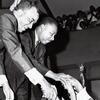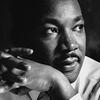I Have a Dream
Rev. Dr. Martin Luther King Jr.
August 28, 1963
Speaker: I have the pleasure to present to you Dr. Martin Luther King, J. R.
Speaker: I have the pleasure to present to you Dr. Martin Luther King, J. R.
Martin Luther King, Jr.: I am happy to join with you today in what will go down in history as the greatest demonstration for freedom in the history of our nation.
Five score years ago, a great American, in whose symbolic shadow we stand today, signed the Emancipation Proclamation. This momentous decree came as a great beacon light of hope to millions of Negro slaves who had been seared in the flames of withering injustice. It came as a joyous daybreak to end the long night of their captivity.
But 100 years later, the Negro still is not free. There are those who are asking the devotees of Civil Rights: “When will you be satisfied?” We can never be satisfied as long as the Negro is the victim of the unspeakable horrors of police brutality. We can never be satisfied as long as our children are stripped of their selfhood and robbed of their dignity by signs stating “For whites only.” No, no we are not satisfied, and we will not be satisfied until “justice rolls down like waters and righteousness like a mighty stream.”
I have a dream that one day on the red hills of Georgia, sons of former slaves and the sons of former slave owners will be able to sit down together at the table of brotherhood.
I have a dream that one day, even the state of Mississippi, a state sweltering with the heat of injustice, sweltering with the heat of oppression, be transformed into an oasis of freedom and justice.
I have a dream that my four little children will one day live in a nation where they will not be judged by the color of their skin but by the content of their character. I have a dream today.
I have a dream that one day down in Alabama with its vicious racists, with its governor having his lips dripping with the words of interposition and nullification, one day right down in Alabama little black boys and black girls will be able to join hands with little white boys and white girls as sisters and brothers. I have a dream today.
I have a dream that one day “every valley shall be exalted, every hill and mountain shall be made low, the rough places will be made plain, and the crooked places will be made straight, and the glory of the Lord shall be revealed, and all flesh shall see it together.”
This is our hope, this is the faith that I go back to the South with. With this faith, we will be able to hew out of the mountain of despair, a stone of hope. With this faith, we will be able to transform the jangling discords of our nation into a beautiful symphony of brotherhood. With this faith we will be able to work together, to pray together, to struggle together, to go to jail together, to stand up for freedom together, knowing that we will be free one day. This will be the day. This will be the day when all of God’s children will be able to sing with new meaning:
My country, ‘tis of thee, sweet land of liberty, of thee I sing. Land where my fathers died, land of the pilgrim’s pride, From every mountainside, let freedom ring!
And if America is to be a great nation, this must become true.
So let freedom ring from the prodigious hilltops of New Hampshire. Let freedom ring from the mighty mountains of New York.
Let freedom ring from the heightening Alleghenies of Pennsylvania. Let freedom ring from the snowcapped Rockies of Colorado.
Let freedom ring from the curvaceous slopes of California.
But not only that. Let freedom ring from Stone Mountain of Georgia. Let freedom ring from Lookout Mountain of Tennessee.
Let freedom ring from every hill and molehill of Mississippi. From every mountainside, let freedom ring.
And when this happens, when we allow freedom ring, when we let it ring from every village and every hamlet, from every state and every city, we will be able to speed up that day when all of God’s children, black men and white men, Jews and Gentiles, Protestants and Catholics, will be able to join hands and sing in the words of the old Negro spiritual:
Free at last! Free at last!
Thank God Almighty, we are free at last. [Applause and singing]
Speaker: On behalf of the National Committee on the March on Washington… Woman singing:
Oh deep in my heart, I do believe, we shall overcome some day.
White man work together, black man work together. We shall overcome some day! Oh, deep in my heart, I do believe, we shall overcome some day.
Crowd singing:
We’ll walk hand in hand, we’ll walk hand in hand some day! Oh, deep in my heart, I do believe.
A. Philip Randolph: I think history was written today which will have its effect on coming generations, with respect to our democracy, with respect to our ideals, with respect to the great struggle of man, God, freedom, and human dignity.
Narrator: There were many who praised this day and said that there had been a new awakening in the conscience of the nation. Others called it a national disgrace. In the wake of this day, more violence was to come, more hatred, but in the long history of man’s cruelty to man, this was a day of hope.
Crowd singing:
Freedom, freedom, freedom, freedom freedom! Freedom, freedom, freedom, freedom freedom!


